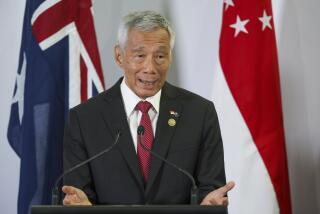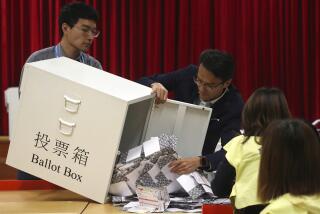Singapore Moves to Boost Minority Representation in Parliament
- Share via
SINGAPORE — Goh Chok Tong bristled last week as he stood before his colleagues in Parliament and promoted a plan to change the electoral system here.
“I don’t think we are tinkering with the system,” declared the first deputy prime minister. “We are making improvements . . . based on 22 years of working it. We are trying to remove a weakness.”
“Tinkering”--the word used by a government official to describe the reaction of some Singaporeans to the proposed change--carries a negative connotation, Goh, the No. 2 man in Prime Minister Lee Kuan Yew’s government, insisted.
His sensitivity reflected the delicate areas into which the government proposal was treading. Explained one ruling party lawmaker: “It is a new idea; it is about politics; and it is about race.”
What Goh outlined were changes in the law and constitution that would institutionalize multiracial representation in Singapore’s Parliament. In a country with an overwhelming Chinese majority of 76% and influential minorities of Malays (15%) and Indians (6%), race is an uncomfortable undercurrent of politics.
While Singaporean leaders claim to be building a multiracial society, Goh admitted “it is make-believe to pretend” that race does not affect voting patterns. And if any racial group here is under-represented in Parliament, he explained, “that community is bound to feel aggrieved, resentful and frustrated. . . . Frustration leads to communal distrust and distrust to friction. Eventually, sparks will fly.
“It would be a disaster for the Chinese community in Singapore if Singapore wakes up one day to find that we have an all-Chinese Parliament.”
The government’s solution, first introduced in November and given a second reading last week, would:
-- Place up to half the seats in Parliament in so-called group constituencies, each represented by three members of Parliament.
-- Require that at least one of the three legislators, dubbed “Team MPs,” be a member of a racial minority.
-- Require that any political party seeking a seat in such a constituency field a three-candidate team. Independents would have to form their own three-person slates.
Voters would cast their ballots for any contending slate, and all three candidates on the winning team would be seated. The remaining parliamentary seats would be contested in traditional one-representative constituencies.
According to political analysts, if the total seats in Parliament remain at 79, up to 13 group constituencies could be formed, meaning 13 assured minority members of Parliament plus any others who win in the traditional districts. The current Parliament contains nine Malay members and six Indians.
After a two-day debate, the proposals were referred to a select committee, which will hold public hearings. In six weeks or less, they are expected to come before Parliament for a final vote, and passage seems assured with the backing of both the government and the leadership of Lee’s People’s Action Party, which holds 77 parliamentary seats.
“If any of you have a better suggestion to secure a multiracial parliament, we are ready to listen,” Goh told his fellow lawmakers.
The new system could be in place in time for the national elections that most analysts expect Lee, Singapore’s leader since independence more than 25 years ago, to call this year.
Still, despite its apparently positive goal, the “Team MP” plan is viewed with suspicion or puzzlement in some quarters here.
For instance, Chiam See Tong, leader of the Singapore Democratic Party and the sole remaining opposition member of Parliament after a colleague was expelled over financial irregularities, puts a reverse interpretation on the effect of mandating minority representation. The plan, he says, would “enshrine racialism in the constitution forever” and heighten race consciousness among a people he claims have come to identify themselves as simply Singaporeans.
Mohammed Awang, secretary general of the opposition Singapore Malay National Organization, declared: “Malay MPs elected under the group representational constituencies would not be able to speak up for the (Malay) community because they would be indebted to their non-Malay teammates for helping them get into Parliament.”
Even some members of the People’s Action Party expressed doubts about the plan, but conceded they could not think of a better way to ensure continued minority representation in Parliament. Some Singaporeans simply wondered why any change was necessary in a system that seemed to be working--the criticism of “tinkering” that agitated First Deputy Prime Minister Goh.
“To my knowledge, it’s uniquely Singaporean,” said Chan Heng Chee, a noted political scientist at the National University of Singapore, of the “Team MP” approach of minority political representation. But she compared the mechanics of group constituencies to party-slate proportional voting systems used in Israel, Australia and a number of other countries.
In outlining the plan, Goh said a review of voting patterns in parliamentary elections in 1981 and 1984 revealed a growing tendency among young voters to choose candidates on the basis of race, religion and language.
He and Prime Minister Lee became concerned that the trend could lead to fewer Malay members of Parliament being elected, Goh added.
“It’s so easy to activate an ethnic identity,” agreed Prof. Chan. “Ethnicity is a very fluid phenomenon. There’s no such thing as saying your country is now racially integrated. You can’t fold your hands and sit back.”
What no analyst or politician was saying in open debate is that the 2.6 million predominantly Chinese Singaporeans are a speck in a region of Muslim Malays. But all the emphasis was on Malay political representation, not, for instance, on the Indians, a smaller community that holds three Cabinet posts in Lee’s government to one for the Malays.
Goh also pointed to the bitter communal divisions in Sri Lanka, where a mostly Buddhist Sinhalese majority is in conflict with a mainly Hindu Tamil minority, in arguing for guaranteed minority representation in Parliament as a positive course to avoid future friction. He quoted Sri Lankan President Junius R. Jayewardene as responding when asked why he failed to prevent the turmoil in his country: “My own lack of intelligence, lack of foresight and courage were the reasons.”
Some opposition politicians are convinced that the “Team MP” concept has less to do with race than with keeping the opposition down. The long-established ruling party will have greater access to quality candidates and political funds to contest the group constituencies.
“The weakness of the opposition is a direct result of the dominance of the PAP (People’s Action Party),” observed Chan. “This party has the will to survive. It seeks to survive. It gives no quarter.”
But if the mood in the next election runs against the government as it did in 1984, when the ruling party’s share of the popular vote slipped sharply despite its victory, the group constituencies could also prove a boon to the opposition, giving it three members at a crack.
Another theory here holds that the proposal is yet another initiative by the 64-year-old Lee to place the country that he has personally dominated for so long into his version of order before stepping out of partisan politics. Lee has hinted this may be his last term as prime minister. But he has also indicated that he might seek to move on to the presidency, a figurehead position in the past, though not likely to remain one if Lee took the post.
The prime minister has lost none of his enthusiasm for a scrap. He is currently embroiled in a contest of wills with Derek Davies, editor of the Far Eastern Economic Review, a regional magazine that ran afoul of a Singaporean law against foreign publications allegedly “meddling” in domestic politics.
Last December, the Singaporean government “gazetted” the Review, curtailing its circulation here from 9,000 copies to 500. Davies then refused to circulate even the 500. Meanwhile, Lee is suing Davies for libel, along with the writer of the offending article. The Review is the fourth publication gazetted in the past 17 months.
More to Read
Sign up for Essential California
The most important California stories and recommendations in your inbox every morning.
You may occasionally receive promotional content from the Los Angeles Times.













